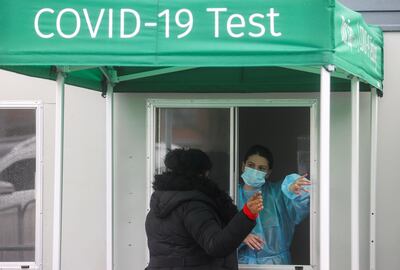There is “no clear evidence” that the UK’s £37 billion ($51.4bn) test-and-trace scheme is reducing rates of coronavirus, MPs said on Tuesday.
The Public Accounts Committee asked the government to justify spending the “staggering amount of public money” after noting the scheme was set up to prevent future lockdowns.
The programme was created to prevent a second national lockdown – but England is at present living under its third.
The cross-party committee also criticised the system’s over-reliance on consultants, finding some were paid more than £6,600 a day.
Baroness Dido Harding, head of the National Institute for Health Protection, which runs the system, said it had been built from scratch and was now doing more tests than in any other comparable country.
She said its performance was improving, with more people testing positive being reached and more of their close contacts being asked to isolate.
"It is making a real impact in breaking the chains of transmission," she said.
Transport Secretary Grant Shapps said criticism of the system “defied logic”.
“Had they not contacted 9.1 million people, told them they had been potentially exposed and asked them to quarantine or self-isolate, where would we have been without it?” he said on BBC TV.
“Just yesterday, there were over one-and-a-half million tests … if you weren’t testing people, you wouldn’t know what was going on.”
The committee said the programme publishes a significant amount of weekly data, including some that shows compliance with the self-isolation rules relied upon by the scheme can be low.
But it criticised the data for failing to show the speed of the process from “cough to contact” and therefore not allowing the public to judge the “overall effectiveness of the programme”.
“There is still no clear evidence to judge NHS test and trace’s overall effectiveness. It is unclear whether its specific contribution to reducing infection levels, as opposed to the other measures introduced to tackle the pandemic, has justified its costs,” the report said.
The group looked at spending on all elements of testing and tracing, amounting to £22 billion in 2020-2021 and another £15bn in 2021-2022.
The bulk of the money is spent on the laboratory-based PCR testing system, which includes hundreds of local test centres and a network of labs across the UK to process the tests.
Another £10 billion was set aside for rapid testing, currently used in schools and areas with high rates of Covid-19.
The money was also used to set up the 12,000-strong national contact tracing team in England.
Meg Hillier, the chair of the committee, said the enormous amounts spent on the scheme left the impression that the government was wasting taxpayers’ money.
“Despite the unimaginable resources thrown at this project, test and trace cannot point to a measurable difference to the progress of the pandemic, and the promise on which this huge expense was justified – avoiding another lockdown – has been broken, twice,” she said.
“British taxpayers cannot be treated by the government like an ATM machine. We need to see a clear plan and costs better controlled.”









